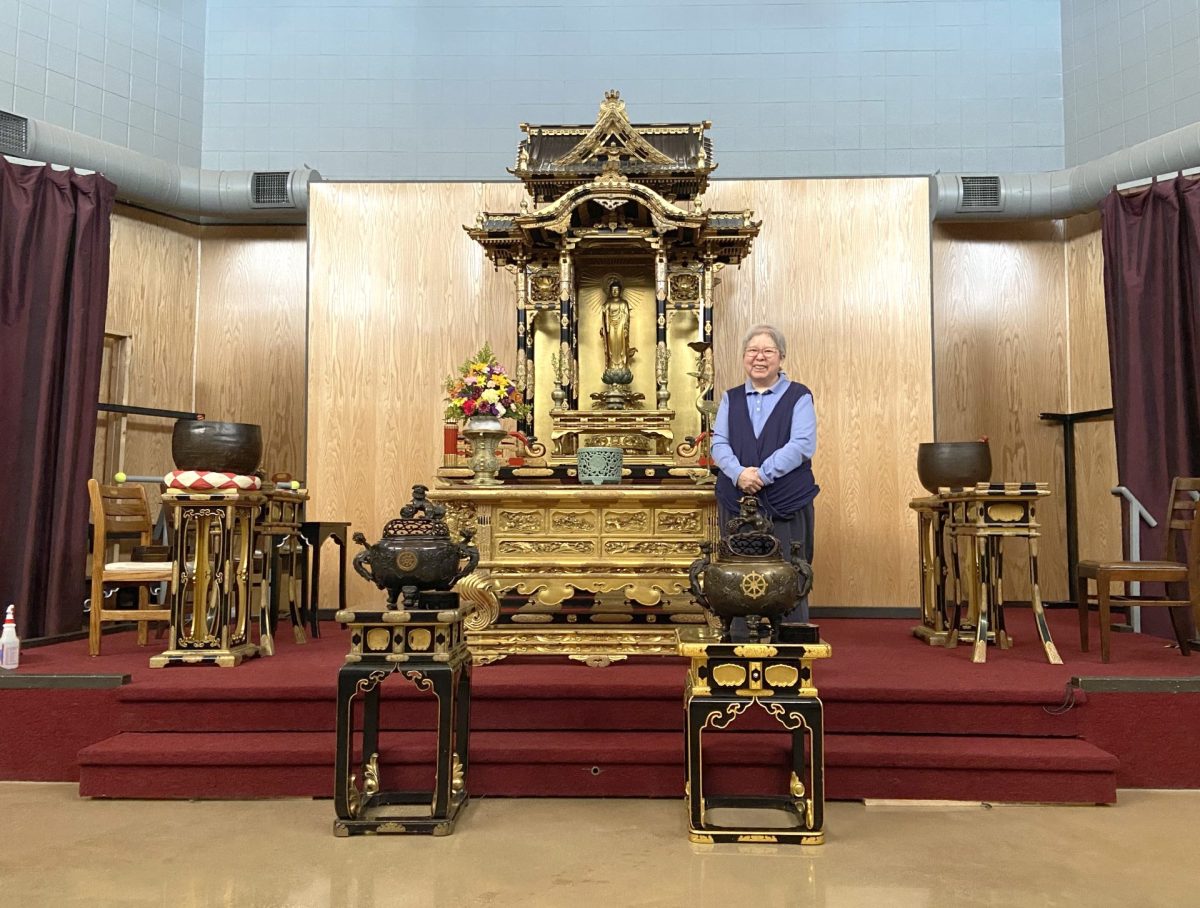The Buddhist Temple of Chicago, located in Uptown, is one of a few temples near DePaul that offers weekly services, meditation and movement practices. While not everyone who studies Buddhism fully adopts its beliefs, many find comfort in its teachings on suffering, compassion, and awareness.
The Rev. Patti Nakai is a Buddhist practitioner and a retired minister emerita at the temple.
“I always tell people when you get out of college, the world isn’t always like you want it to be, and you run into difficulties with your job or relationships. You’re looking for a way to deal with what Buddhists call ‘suffering,’” Nakai said. “I found Buddhism really speaks to that.”
On Sundays, the temple hosts services, sitting in rows, doing readings and singing songs. Other days of the week, they have other practices like Qigong — a movement and breathing exercise — as well as meditation times.
As a member, Nakai has been here for five years. She taught the children’s group and the Dharma school. She’s been serving as a minister since 1995 and retired in 2013.
“Listen, keep an open mind and just know that this is just a first step,” Nakai said. “There are many options out there, this temple is just a gateway.”
The temple started in 1944 as Japanese Americans were being released from concentration camps nearing the end of World War II. The first temple was in Hyde Park, but in the mid-1950s, its members moved to the location in Uptown, 1151 W. Leland Ave.
There are very few young members of the temple aside from children in the kids group. Nakai attributes this to a lack of life experience, but the Buddha, Siddhartha Gautama, was 29 when he experienced wanting to change.
There are many different types of Buddhism. The Buddhist Temple of Chicago follows the Jōdo Shinshū tradition, also known as Shin Buddhism or the True Pure Land School, from Mahayana, the Eastern practice of China, Korea and Japan.
Nakai says one thing the public needs to know about Japanese Americans and their culture is that people like her grandparents had to conform to the popular American culture. The most prominent culture of conformity is that of Christian Americans. But there have been revisions to create more accuracy, such as changing the name from Buddhist Church of Chicago to Temple.
Buddhism is a religious practice and faith tradition that originated in South Asia usually dated around the fifth century B.C. Siddhartha Gautama, a Hindu prince, saw four things that struck him: someone who was sick, someone who was aging, someone who was dying, so he left home to find a solution to human suffering.
Tibetan Buddhist monks will create a sand mandala here in Chicago, and they will visit DePaul on Wednesday, April 23.
Darcie Price-Wallace is an adjunct religious studies faculty member at DePaul and also teaches at Loyola and Northwestern University. She teaches Buddhist practices, history and stories.
“The most important thing to know about Buddhism is that it is a vibrant and diverse tradition,” Price-Wallace said. “It’s asking questions about how to identify and understand the nature of reality, the nature of mind and ultimately how to cultivate awareness, compassion and wisdom.”
People may find the open-ended and nondogmatic nature of Buddhism refreshing. It invites exploration rather than requiring immediate belief.
DePaul offers several Buddhist classes, including Buddhist history, American Buddhism and Buddhist thought in a cultural context. In these courses, students engage in meditative practices, meet different faith practitioners who visit and learn through art and video.
“I think that any sort of faith tradition that inspires and compels someone to be compassionate and loving is beneficial,” Price-Wallace said. “I think some people find the Buddhist path as a tradition that encourages or prompts that for them.”
Some students at DePaul choose to major in Buddhist studies, though you don’t have to be a Buddhist to take these classes. Leah Cunningham, a junior animation major, is one such student.
“I wouldn’t necessarily call myself religious, more spiritual or agnostic,” Cunningham said. “I like the tradition and practices or mindset of Buddhism, but I don’t necessarily believe all of it historically, as I don’t with other religions.
Not everyone who studies Buddhism fully adopts its beliefs, but many find comfort in its teachings on suffering, compassion and awareness. In addition to Buddhist temples, DePaul’s Mission and Ministry also offers services like pastoral care, interfaith events and quiet spaces for meditation. Weekly Mass, interfaith worship and programs like Interfaith Scholars encourage connection.
“I’m certain some of it is true, maybe even a lot of it,” Cunningham said. “But there are certain parts that just like any religion I think are metaphors and analogies taken literally. But it is really interesting.”
Learning about Buddhism is as much about finding personal understanding as it is about studying a faith. The tradition’s emphasis on mindfulness and presence offers tools important for today’s complicated world.
Related Stories:
- Cooking for a Cause: Bigger Table hosts fundraiser at Maman Zari
- Chicago’s ‘One System Initiative’: A bold reform or a band-aid solution for unhoused communities?
- Chicago Plan Commission approves $7 billion United Center expansion
Support Student Journalism!
The DePaulia is DePaul University’s award-winning, editorially independent student newspaper. Since 1923, student journalists have produced high-quality, on-the-ground reporting that informs our campus and city.
We rely on reader support to keep doing what we do. Donations are tax deductible through DePaul's giving page.


